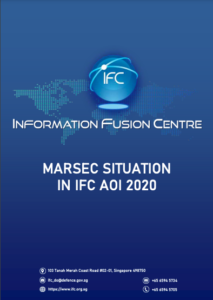Last month, the Information Fusion Centre (IFC) based in Singapore hosted the 37th Shared Awareness Meeting (SAM) attended by more than 220 participants from 31 countries, consisting of stakeholders from maritime enforcement agencies, the shipping community, and other information fusion centres around the world.
Experts from maritime authorities such as United Kingdom Maritime Trade Operations (UKMTO) Dubai, Maritime Information Cooperation & Awareness (MICA) centre, and Maritime Information Fusion Centre for Latin America spoke on the maritime security (MARSEC) situation in their respective regions. Swire Pacific Offshore, a key partner, also joined the session to provide their insights and lessons learnt from a hijack incident in the Gulf of Guinea.
The event focused on ways to raise maritime security (MARSEC) awareness and encourage best practices, highlighting trends and challenges with regards to
- Theft, Robbery and Piracy at Sea (TRAPS);
- Maritime Terrorism (MT);
- Maritime Incidents (MI);
- Illegal, Unreported and Unregulated Fishing (IUU);
- Contraband Smuggling (CS); and
- Irregular Human Migration (IHM)
During the event, the newly-published IFC annual report for 2020 was presented, providing an update of the MARSEC situation within IFC’s Area of Interest which spans from the Indian Ocean to North Asia, and to the northern tip of Australia.
SAM is an important platform conducted tri-annually to engage with the various stakeholders to enable the sharing of regional and global maritime issues, and to learn from each other about industry’s best practices. The importance of platforms like SAM, is made even more apparent given the challenges faced in Maritime Security (MARSEC) and the shipping community due to the COVID-19 pandemic.
“While COVID-19 brought the world to an almost complete stop in 2020, MARSEC incidents continued to take place, with a total of 1919 recorded incidents within IFC’s Area of Interest.” LCDR Christian Hegering, German International Liaison Officer attached at IFC, highlighted during SAM event.
“Your participation reaffirms our shared commitment towards maritime security and cooperation between enforcement agencies and the shipping community, which is vital in keeping our seas safe for all.”LTC Lester Yong, Head Information Fusion Centre, mentioned.
According to the report, for 2020, a total of 113 TRAPS incidents were recorded. This was higher than in 2019 and 2018, which were 97 and 101 respectively. In particular during 2020:
- May and November were observed to have the highest number of incidents.
- Bulk carriers were the most attacked vessel type, followed by Tankers and Container Ships.
- The highest number of type of incidents recorded were Sea Theft, with 63 incidents, or slightly more than half of all TRAPS incidents, which is consistent with prevailing perpetrators’ modus operandi – largely confined to petty thefts and being non-violent in nature.
With regards to Maritime Incidents (MI), according to IFC annual report, during last year 895 maritime incidents were reported, a marginal 0.5% (4) decrease compared to the same period in 2019 and a 10.5% (94) increase to the same period in 2018. As explained, this observed increase in incidents since 2018 may be attributed to the continuous improvement of data collection processes and incident reporting in the region. Additionally, this rise can possibly be attributed to the changes in weather conditions within the period covered; vessels sinking or capsizing, mechanical failure, grounding, collision, vessel being detained, fire-explosion, medical evacuation, man overboard and missing incident accounted for most maritime incidents in IFC’s AOI.
The main type of vessels involved in maritime incidents were
- fishing vessels (32%),
- container/cargo ships (17%),
- passenger vessels (7%),
- other vessels comprising small boats, civilian landing craft tanks, dredgers, yachts,
speed boats, etc. (25%) - tankers (7%)
- bulk carriers (4%)
- tugs and/or barges (5%)
government vessels (1%) and - unknown vessels (2%)
IFC urges seafarers to remain vigilant especially in areas where the threat level is assessed to be of concern; in that regard, IFC issues related Assessments via its Weekly Report or Spot Commentaries.
Lastly, ships should apply the appropriate security measures (such as Tugs and Barge Guide, Guide for Tankers Operating in Asia, or Regional Guide to Counter Piracy and Armed Robbery Against Ships in Asia) while ship masters should also be aware and refer to the Maritime Security Charts Q6112 and Q6113, both published by the UK Hydrographic Office.
Read IFC Annual Report herebelow































































